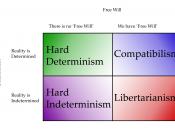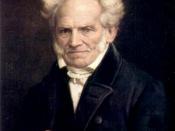"To be or not to be, this is the question" . In this famous and well known statement Shakespeare opens an enormous number of questions and reflections about life. Through many years ordinary people and remarkable philosophers have debated about this quandary. So many dilemmas have been raised around this issue such as: what is the meaning for "to be", weather the life is real or merely a dream, to be existent or not, and so on. Maybe the most arguable of them is the conflict between freedom and determinism. Among many works surround this theme there are two essays that worth to be mentioned here. The first one is "Does Determinism Eliminate Responsibility?" by W. T. Stace. The second one is "What Means This Freedom?" by John Hospers.
Stacy believes that there are many mistakes around free will and determinism. First of all, he points a lack of morality as consequence of lack of free will.
He believes that there cannot be morality without free will. Furthermore, he thinks that many professors and philosophers, that deny free will, make their choices when it comes to real life, as he says "For when it comes to doing anything practical, even of the most trivial kind, they invariably behave as if they and others were free" . He follows his analysis point that to define free will as indeterminism is wrong. Along with he draws his own definition for the problem, in his words "Acts freely done are those whose immediate causes are psychological states in the agent. Acts not freely done are those whose immediate causes are states of affairs external to the agent" . To illustrate what he means he uses some examples such as that when Gandhi didn't eat for a week he did it by...


